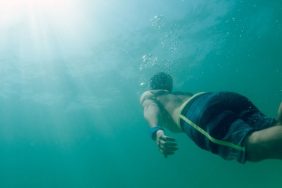Sharks launched a record 98 unprovoked attacks on humans worldwide last year resulting in six deaths, according to the Shark Attack File housed at the University of Florida.
The United States led the world in attacks with 59, thanks to an abundance of populated coastline. Australia with 18 and South Africa with eight rounded out the top three.
But those attacks, many of which we have been following at LiveOutdoors, don’t necessarily mean you should sell your surfboard, donate your swim trunks to charity, or go looking for a bigger boat.
George Burgess is the curator of the world’s clearinghouse of shark-attack data, housed at the Florida Museum of Natural History on the University of Florida campus. According to Burgess, two factors are fueling the increase in chewed up humans. First, there are simply more sharks. Shark populations have rebounded heartily in the past decade, thanks to a variety of conservation measures.
Second, more people are spending more time in the water. As the earth’s population increases, and more people swim, wade, dive, surf etc., there are simply more tasty human morsels splashing about.
More sharks plus more people spending more time in the water means more bites, simple as that. The number of attacks is increasing, but not necessarily the rate of attacks. In fact, as an individual your odds of being attacked by a shark are pretty miniscule. You’re 33 times more like to be bitten by a dog, according to Shark File.
The Shark File also recorded 14 “boat attacks” not involving human injuries, as well as two stingray attacks, and one each by an eel and a bluefish.
The Shark File curator also points to a less sinister culprit in the increase in shark attacks – Facebook. The Shark File’s Facebook page regularly receives unsolicited reports of shark attacks, and Burgess believes that improved reporting due to social media may simply mean that more attacks are being reported and recorded than in the past.
Still, if sharks make you nervous – not to mention eels or bluefish – you might be interested to know that 49% percent of reported shark attacks last year happened to surfers and other board sport participants. Cowa-not-so-bunga, dude!
“Surfers have been the most-affected user group in recent decades,” according to Shark File, “the probable result of the large amount of time spent by people engaged in a provocative activity (kicking of feet, splashing of hands, and “wipeouts”) in an area commonly frequented by sharks, the surf zone”.
While swimmers and waders were the targets 42% of the time last year, not a single scuba diver was attacked.
If you do become an unfortunate, statistically unlikely victim of a shark attack, Shark File has the following helpful advice:
“Hitting a shark on the nose, ideally with an inanimate object, usually results in the shark temporarily curtailing its attack. One should try to get out of the water at this time.”
Photo credit: Dreamstime








